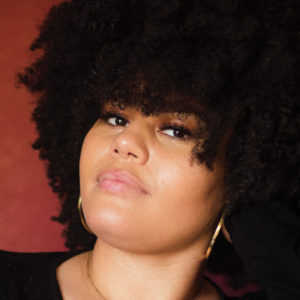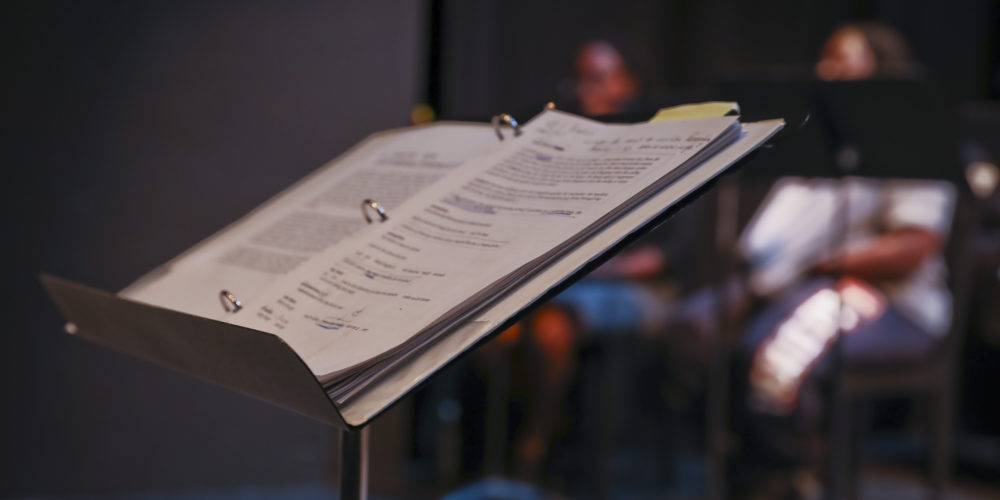16 Jul Tyler English-Beckwith Artist Talk
 What was it about the environment of the play, an office, that inspired you to have the story take place there in particular?
What was it about the environment of the play, an office, that inspired you to have the story take place there in particular?
Offices have always been so interesting to me especially when a person has been inhabiting one for a very long time. The books that accumulate, the chair that is chosen, which photos are framed, is all a performance. I’m also interested in closed doors. How do the dynamics change between two people when the door is open versus when it’s closed? As Harrison and B’s relationship grows, B’s comfort in Harrison’s personal space expands. But it’s just his office. Not his home, not his bedroom. It’s his work space. She is only allowed comfort in that space.
Was there a specific moment for you that defined the direction you wanted your play to take?
In my last day of class with Suzan-Lori Parks she told me that she thought that Mingus (then a three-character play) was a two-hander, and since that day it’s been a two-hander.
What is it about playwriting that you feel effectively told the story you wanted to tell, especially over other forms of storytelling?
In other readings of Mingus, my favorite part of the experience has been watching the audience physically react to different scenes. When an audience member squirms, or tenses up in their shoulders, or leans forward or exasperates in a certain way is so much a part of the experience of Mingus. I find that the audience wants so badly to say to B, “Don’t go back to the office! Don’t believe everything this man tells you!” That communal experience of watching a young woman make familiar mistakes is integral to the story telling.
Is there any message or anything in particular, that you want the audience to take away from your play?
I want other Black women, of all ages, to leave Mingus feeling capable. B could have written that essay without the help of Harrison. She always had it in her. She was always brilliant, always curious. She was all she needed.
Are there any contemporary plays that inspire you as a playwright and/or gave you that push to begin and continue writing your play?
The play that sparked my interest in becoming a playwright was Tracey Scott Wilson’s The Good Negro. I saw it when I was 15 on a class field trip to Dallas Theater Center. Even though that was over a decade ago, the memory of sitting in that audience is still so visceral to me. I remember in the class discussion afterward, I couldn’t stop talking about it. It just ignited something in me instantly. I also love reading the work of other emerging playwrights who have since become friends. Eliana Pipes, Dave Harris, Kimberly Belflower, Sanaz Toosi, Jeremy O’Brien, and so many other people I’m forgetting are all playwrights whose work I refer back to constantly.
In Mingus the story revolves primarily around the relationship between B and Harrison. What inspired you to discuss the topics covered in Mingus through the lens of an intimate and personal relationship instead of a more broad and historical story?
In the January scene B says, “Theory isn’t just theory to me. I have to live this ‘non-human’ life.” Before I had even written that line, that was the thesis of the play to me. While I believe that theory is important to imagine and map out a revolutionary way of being, the “being” is what is most urgent. As a student myself, I was struck by the hypocrisy that I saw in the academy especially when it came to the interpersonal relationships between Black men and women. B and Harrison’s relationship is shrouded by this air of elevated thinking, but in actuality it’s rooted in the complexity of their physical proximity.
Get your tickets to #BAPF2020 now!
Tyler English-Beckwith is a recent graduate of the Dramatic Writing MFA program at NYU. She holds a B.A. in African and African Diaspora Studies as well as a B.A. in Theater and Dance from The University of Texas at Austin. Originally from Dallas, Texas, Tyler currently resides in Brooklyn, NY. Her plays include Mingus for which she received the 2018 KCACTF Paula Vogel Playwriting Award, was a 2019 O’Neill National Playwrights Conference finalist, and was a finalist for the 2018 Goldberg Playwriting Prize. Her play TWENTYEIGHT received a world premiere in 2017 at The Vortex in Austin, Texas where it received Honorable Mention on The Austin Chronicle’s Top Ten Plays of 2017. She is currently a member of Page 73’s 2020 Interstate 73 Writers Group. Tyler recently wrote, co-directed and starred in a series of afro-futurist short films for Meow Wolf’s narrative chapter, “The Rift” which can be seen online at meowwolf.com and in their flagship exhibit House of Eternal Return in Santa Fe, NM. Tyler hopes to create worlds, in her writing, where black women live beyond the basic means of survival and have the audacity to be autonomous.
About Mingus: B Coleman is a high achieving, first generation college student who has revolutionary ideas but struggles with the confidence to put them forward. When the opportunity arises to win a prestigious scholarship, she seeks out a letter of recommendation from the most popular faculty member on campus, Harrison Jones, a former member of the Black Panther Party, current Black Studies professor, and prolific author from Oakland. Harrison takes her under his wing as a mentee and challenges B to see her own worth. Over conversations on theory, jazz, and family, they unlock something inside each other, and their relationship develops into an undefined entangled web of blurred lines. When Harrison makes a bold decision, will B finally find the strength to use her voice?



No Comments